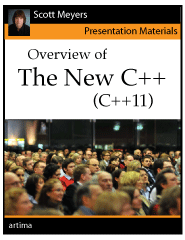Buy it now
Features
- Same content as the training course: The PDF you'll
get is an exact snapshot of Scott's full-color training materials on the
day he generates the PDF. You'll get not only the
slides Scott shows in class, you'll also get the accompanying notes—the
very ones Scott uses. To see exactly what you'll get you can
view a free sample.
- No DRM: You may copy the PDF to as
many devices as you like, annotate it in any way you want, print it in part
or in full as many times as you choose. Because the PDF is for your
personal use only, you are not permitted to provide copies to friends or
colleagues, may not install it on servers for public access, can't use it
as the basis for presentations, etc., but we trust you to adhere to these
restrictions; the PDF itself doesn't try to prevent unauthorized uses. (For
more permissive usage options, consider licensing
the materials.)
- Free updates for life: You are entitled to
free updates to the materials as long as Scott produces them.
Major revisions are included, so you won't have to pay again later for a "new edition."
- Volume discounts: Want a copy for every member of your team or department? Discounts of 30-50% off single-PDF prices apply to purchases of as few as 10 copies. As the saying goes, the more you buy, the more you save! Consult the discount schedule for details.
About the course
Specification of the latest version of C++
(“C++11”) was completed in 2011, and many compilers
now offer a wealth of
features from the revised language. And such features!
auto-declared variables reduce typing drudgery
and syntactic noise; Unicode, threading support, and
alignment control address
important functionality gaps; and rvalue
references and variadic templates facilitate the creation
of more efficient, more flexible libraries. The standard
library gains resource-managing smart pointers, new
containers, additional algorithms, support for regular
expressions, and more. Altogether, C++11 offers
much more than “old” C++. This
intensively technical seminar introduces the most important
new features in C++11 and explains how to get the most out
of them.
That's not all. A feature-complete draft of C++11's
successor, "C++14," has now been adopted, and this
course also covers select C++14 features. These include
deduced function return types; reader/writer locks; and
extensions to lambda expressions (auto
and variadic parameters, generalized captures). You won't
find a more up-to-date examination of the new C++ anywhere!
Detailed topic outline
- The History and Vocabulary of C++ Evolution
- Sample Program: C++98 vs. C++11
- Features for Everybody:
auto for Type Declarations- Range-Based
for Loops
- “>>” as Nested Template Closer
nullptr - Enhanced
enums
- Unicode characters and strings
- Raw string literals
- Uniform initialization syntax
- Initializer lists
- Lambda Expressions
- Template Aliases
- Threading Support
- Library Enhancements:
- New Container Features
- Smart Pointers (
shared_ptr, weak_ptr,
unique_ptr)
- Hash Tables
- Singly-Linked Lists
- Fixed-Size Arrays
- Tuples
- Regular Expressions
- Generalized Functors(
function)
- Generalized Binder (
bind)
- New Algorithms
- Other New Library Functionality
- Features Primarily for Class Authors:
- Move Support, Rvalue References, and Perfect Forwarding
default Member Functions delete Functions - Default Member Initialization
- Delegating Constructors
- Inheriting Constructors
- Features Primarily for Library Authors:
- Static Assertions
explicit Conversion Functions - Variadic Templates
decltype - Alignment control
(i.e.,
alignof, alignas, etc.
- More C++11 Features (Overview)
- More C++14 Features (Overview)
- Removed and Deprecated Features (Overview)
About the author
|
Scott Meyers
is one of the world's foremost
authorities on C++ software development. He provides training and
consulting services to clients worldwide.
Scott wrote the best-selling Effective C++ series (Effective C++, More
Effective C++, and Effective STL), is consulting editor for Addison
Wesley's
Effective Software Development Series
and conceived the boutique conferences The C++ Seminar and C++ and Beyond.
In 2009 he received the
Dr. Dobb's Excellence in Programming Award.
He received his PhD in Computer Science from Brown University in 1993.
|
|
